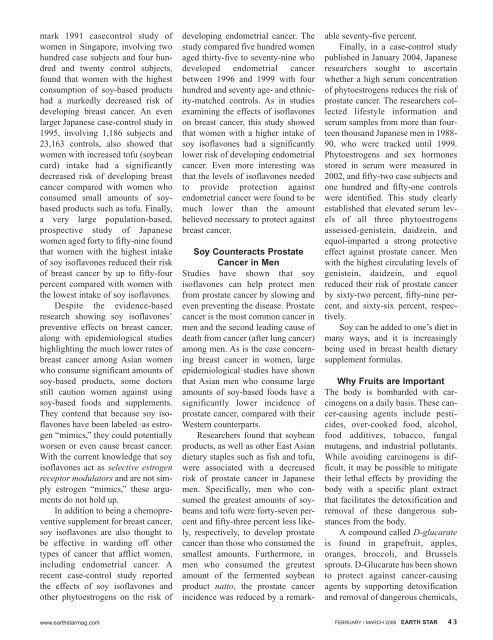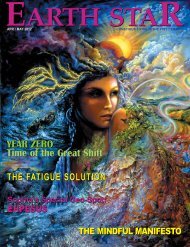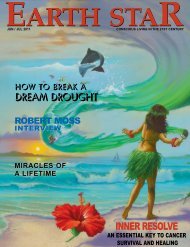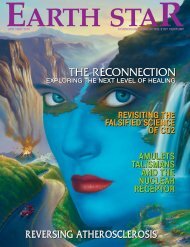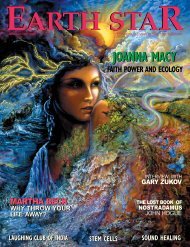GREGG BRADEN GREGG BRADEN - Earthstar
GREGG BRADEN GREGG BRADEN - Earthstar
GREGG BRADEN GREGG BRADEN - Earthstar
- No tags were found...
You also want an ePaper? Increase the reach of your titles
YUMPU automatically turns print PDFs into web optimized ePapers that Google loves.
mark 1991 casecontrol study ofwomen in Singapore, involving twohundred case subjects and four hundredand twenty control subjects,found that women with the highestconsumption of soy-based productshad a markedly decreased risk ofdeveloping breast cancer. An evenlarger Japanese case-control study in1995, involving 1,186 subjects and23,163 controls, also showed thatwomen with increased tofu (soybeancurd) intake had a significantlydecreased risk of developing breastcancer compared with women whoconsumed small amounts of soybasedproducts such as tofu. Finally,a very large population-based,prospective study of Japanesewomen aged forty to fifty-nine foundthat women with the highest intakeof soy isoflavones reduced their riskof breast cancer by up to fifty-fourpercent compared with women withthe lowest intake of soy isoflavones.Despite the evidence-basedresearch showing soy isoflavones’preventive effects on breast cancer,along with epidemiological studieshighlighting the much lower rates ofbreast cancer among Asian womenwho consume significant amounts ofsoy-based products, some doctorsstill caution women against usingsoy-based foods and supplements.They contend that because soy isoflavoneshave been labeled ·as estrogen“mimics,” they could potentiallyworsen or even cause breast cancer.With the current knowledge that soyisoflavones act as selective estrogenreceptor modulators and are not simplyestrogen “mimics,” these argumentsdo not hold up.In addition to being a chemopreventivesupplement for breast cancer,soy isoflavones are also thought tobe effective in warding off othertypes of cancer that afflict women,including endometrial cancer. Arecent case-control study reportedthe effects of soy isoflavones andother phytoestrogens on the risk ofdeveloping endometrial cancer. Thestudy compared five hundred womenaged thirty-five to seventy-nine whodeveloped endometrial cancerbetween 1996 and 1999 with fourhundred and seventy age- and ethnicity-matchedcontrols. As in studiesexamining the effects of isoflavoneson breast cancer, this study showedthat women with a higher intake ofsoy isoflavones had a significantlylower risk of developing endometrialcancer. Even more interesting wasthat the levels of isoflavones neededto provide protection againstendometrial cancer were found to bemuch lower than the amountbelieved necessary to protect againstbreast cancer.Soy Counteracts ProstateCancer in MenStudies have shown that soyisoflavones can help protect menfrom prostate cancer by slowing andeven preventing the disease. Prostatecancer is the most common cancer inmen and the second leading cause ofdeath from cancer (after lung cancer)among men. As is the case concerningbreast cancer in women, largeepidemiological studies have shownthat Asian men who consume largeamounts of soy-based foods have asignificantly lower incidence ofprostate cancer, compared with theirWestern counterparts.Researchers found that soybeanproducts, as well as other East Asiandietary staples such as fish and tofu,were associated with a decreasedrisk of prostate cancer in Japanesemen. Specifically, men who consumedthe greatest amounts of soybeansand tofu were forty-seven percentand fifty-three percent less likely,respectively, to develop prostatecancer than those who consumed thesmallest amounts. Furthermore, inmen who consumed the greatestamount of the fermented soybeanproduct natto, the prostate cancerincidence was reduced by a remarkableseventy-five percent.Finally, in a case-control studypublished in January 2004, Japaneseresearchers sought to ascertainwhether a high serum concentrationof phytoestrogens reduces the risk ofprostate cancer. The researchers collectedlifestyle information andserum samples from more than fourteenthousand Japanese men in 1988-90, who were tracked until 1999.Phytoestrogens and sex hormonesstored in serum were measured in2002, and fifty-two case subjects andone hundred and fifty-one controlswere identified. This study clearlyestablished that elevated serum levelsof all three phytoestrogensassessed-genistein, daidzein, andequol-imparted a strong protectiveeffect against prostate cancer. Menwith the highest circulating levels ofgenistein, daidzein, and equolreduced their risk of prostate cancerby sixty-two percent, fifty-nine percent,and sixty-six percent, respectively.Soy can be added to one’s diet inmany ways, and it is increasinglybeing used in breast health dietarysupplement formulas.Why Fruits are ImportantThe body is bombarded with carcinogenson a daily basis. These cancer-causingagents include pesticides,over-cooked food, alcohol,food additives, tobacco, fungalmutagens, and industrial pollutants.While avoiding carcinogens is difficult,it may be possible to mitigatetheir lethal effects by providing thebody with a specific plant extractthat facilitates the detoxification andremoval of these dangerous substancesfrom the body.A compound called D-glucarateis found in grapefruit, apples,oranges, broccoli, and Brusselssprouts. D-Glucarate has been shownto protect against cancer-causingagents by supporting detoxificationand removal of dangerous chemicals,www.earthstarmag.com FEBRUARY / MARCH 2008 EARTH STAR 43


